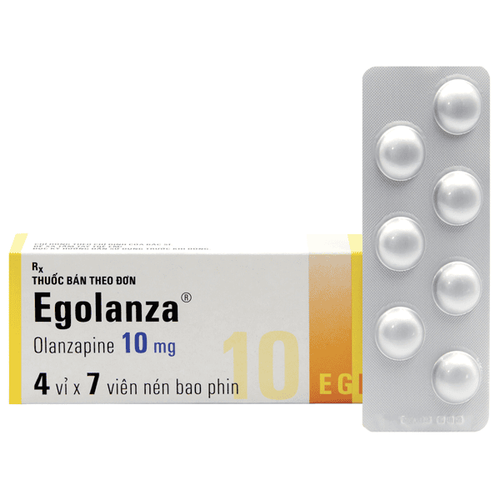This is an automatically translated article.
Queitoz drug 200mg belongs to the group of antipsychotics, the drug is sold only when prescribed by a doctor, patients are not allowed to buy and use the drug on their own due to the risk of serious side effects. So what is the use of Queitoz 200mg?
1. What is Queitoz 200?
Queitoz 200 is a product of Dat Vi Phu Pharmaceutical Joint Stock Company (Davipharm) with the main active ingredient being Quetiapine fumarate 200mg. Queitoz 200mg is available as a film-coated tablet. Quetiapine is an atypical antipsychotic. After entering the body, Quetiapine and its active metabolite in plasma (N - dealkyl quetiapine) will initiate action on a variety of neurotransmitter receptors. , they have an affinity for brain Serotonin (5HT2) receptors and dopamine D1 and D2 receptors. Due to its higher selectivity for serotonin (5HT2) receptors in the brain than for dopamine D2 receptors, this active substance is highly appreciated for its clinical antipsychotic properties and has a low risk of adverse effects. desired on the extrapyramidal system.In addition, the N - dealkyl quetiapine metabolite has a high affinity for the norepinephrine (NET) transporter. Both Quetiapine and N - dealkyl quetiapine also have high affinity for Histaminergic and Adrenergic alpha 1 receptors, and lower affinity for Adrenergic alpha 2 and Serotonin 5HT1A receptors. Quetiapine has negligible affinity for muscarinic cholinergic or benzodiazepine receptors.
Quetiapine is well absorbed and completely metabolized after oral administration, bioavailability is not significantly affected by food. Quetiapine and its metabolite N - dealkyl quetiapine are eliminated in feces (20%) and urine (73%).
2. Uses of the drug Queitoz 200
Queitoz 200 is indicated for use in the following cases:
Treatment of schizophrenia. Treatment of bipolar disorder. Queitoz 200 is contraindicated in patients with hypersensitivity to any of its ingredients.
3. Dosage of the drug Queitoz 200
Queitoz 200 is administered orally with the following dosage:
3.1. Dosage of Queitoz 200 for adults Treatment of schizophrenia : Quetiapine should be taken twice daily, with or without meals, the total daily dose of Quetiapine is:
Day 1: 50 mg; Day 2: 100 mg; Day 3: 200 mg; Day 4: 300mg; From day 4 onwards, the dose of Queitoz 200 should be adjusted according to the usual effective dose of 300 - 450 mg/day according to the clinical response and tolerability of the individual patient, even if the dose can be adjusted. drug Queitoz 200 in the range of 150 - 750 mg / day. Treatment of Bipolar Disorder: Quetiapine should be taken orally twice daily, either as monotherapy with Queitoz 200 or as adjunctive therapy to psychoactive drugs, total daily dose of Quetiapine:
Day 1: 100 mg ; Day 2: 200 mg; Day 3: 300mg; Day 4: 400mg; The dose of Queitoz 200 can be gradually adjusted up to 800 mg/day on the 6th day, however, it should be noted that each dose increase should not exceed 200 mg/day, the dose of Queitoz 200 can be adjusted depending on the dose. The clinical response and tolerability of each patient ranges from 200 to 800 mg/day. The usual dose of Queitoz 200 that is effective in treating bipolar disorder is 400-800 mg/day. 3.2. Dosage of Queitoz 200 in the elderly Care should be taken when using Quetiapine in the elderly, especially during the initiation of Queitoz 200. Elderly patients are initiated on Quetiapine 25 mg/day, increasing the dose in increments of 25 to 50 mg daily to a therapeutically effective dose (the dose of Queitoz 200 in the elderly will be lower than the effective dose). treatment in young patients).
3.3. Dosage of Queitoz 200 in Children and Adolescents The safety and effectiveness of Queitoz 200 in children and adolescents have not been evaluated.
3.4. Dosage of Queitoz 200 in Hepatic and Renal Impairment Oral clearance of quetiapine is reduced by approximately 25% in patients with hepatic or renal impairment, as quetiapine is extensively metabolised in the liver. Therefore, caution should be exercised when using Queitoz 200 in patients with hepatic impairment. For patients with hepatic or renal impairment, Queitoz 200 should be initiated at a dose of Quetiapine 25 mg/day, increasing the daily dose in increments of 25-50 mg until a therapeutic effect is achieved.
4. What to do in case of an overdose of Queitoz 200?
In clinical trials, survivors of quetiapine overdoses up to 30 g have been reported. Most of the cases of patients who overdosed on Queitoz 200 reported no adverse events or completely recovered. However, a fatal case was reported in a clinical trial following an overdose of quetiapine of 13.6 g in combination with other drugs. Since the introduction of the drug on the market, quetiapine overdose causing death or coma has been very rare.
In general, the signs and symptoms of Queitoz 200 overdose are often attributed to the increased pharmacological effects of the drug causing sedation and sedation, tachycardia, and hypotension.
Currently there is still a specific antidote for quetiapine. If severe intoxication occurs, consider the possibility of multiple drug effects and provide special care: establish and maintain an airway, ensure ventilation, provide adequate oxygen, monitor and support Cardiovascular support, then continue to monitor the patient closely until the disease fully recovers.
5. Side effects of the drug Queitoz 200
When using the drug Queitoz - 200 may experience undesirable effects including:
Drowsiness; Dizzy; Dry mouth; Mild weakness; Constipation; Fast heart beat; Orthostatic hypotension; Undigested; Faint; Neuroleptic malignant syndrome; Neutropenia ; Peripheral edema; Increased blood sugar; Weight gain.
6. Be careful when using Queitoz 200
Trials have documented asymptomatic vitreous change in patients on long-term treatment with quetiapine. It is therefore recommended that patients undergo regular eye examinations for signs of cataracts at the start of treatment with quetiapine, every 6 months during treatment with Queitoz 200. Quetiapine should be used with caution in patients with hepatic impairment, renal impairment, cardiovascular disease or hypotension, cerebrovascular disease, a history of epilepsy, or conditions that may lower the patient's seizure threshold. When quetiapine is used to treat the depressive phase of bipolar disorder, patients should be carefully monitored during the initial phase of therapy because suicide is an inherent risk in patients with depression. Severe neutropenia (<0.5 x 109/l) has rarely been reported in clinical trials with quetiapine, however most severe neutropenia occurred within the first 2 months of treatment with Quetiapine. Quetiapine. Hyperglycemia and a few reports of diabetes have been reported, although a causal link to diabetes has not been established. Quetiapine should be used with caution in patients with cardiovascular disease, cerebrovascular disease, or other conditions that may cause hypotension because quetiapine causes orthostatic hypotension, especially at the beginning of dose adjustment, which often occurs. in the elderly. Quetiapine may cause tardive dyskinesia during prolonged treatment, and as soon as any signs or symptoms of tardive dyskinesia are observed, dose reduction or immediate discontinuation should be considered. Neuroleptic malignant syndrome has been associated with treatment with antipsychotic drugs including quetiapine with manifestations including excessive body temperature, mental changes, muscle spasticity, and autonomic instability. , increased creatine phosphokinase. Then. The doctor will instruct the patient to stop taking Quetiapine and start treatment. Reactions due to abrupt discontinuation of Quetiapine: nausea, vomiting, insomnia, relapse of psychotic symptoms, involuntary movement disorders. Quetiapine has not been approved for the treatment of dementia-related psychosis, and an increased risk of death has been reported in elderly patients with dementia-related psychosis. Quetiapine can cause drowsiness, patients taking Queitoz 200 should be careful when operating machines, including driving. The efficacy and safety of Quetiapine in pregnancy have not been established, and Queitoz 200 should be used during pregnancy only when the benefits outweigh the risks. The extent to which quetiapine is secreted into breast milk is unknown, so women should discontinue nursing while taking Queitoz 200.
7. Drug interactions of the drug Queitoz 200
Increased risk of drowsiness and orthostatic hypotension when using Queitoz 200 with alcohol. Inducers of CYP3A4 (phenytoin, carbamazepine ..) may decrease the plasma concentration of Queitoz 200 . CYP3A4 inhibitors (ketoconazole, erythromycin...) may increase plasma concentrations of Queitoz 200.
Please dial HOTLINE for more information or register for an appointment HERE. Download MyVinmec app to make appointments faster and to manage your bookings easily.













